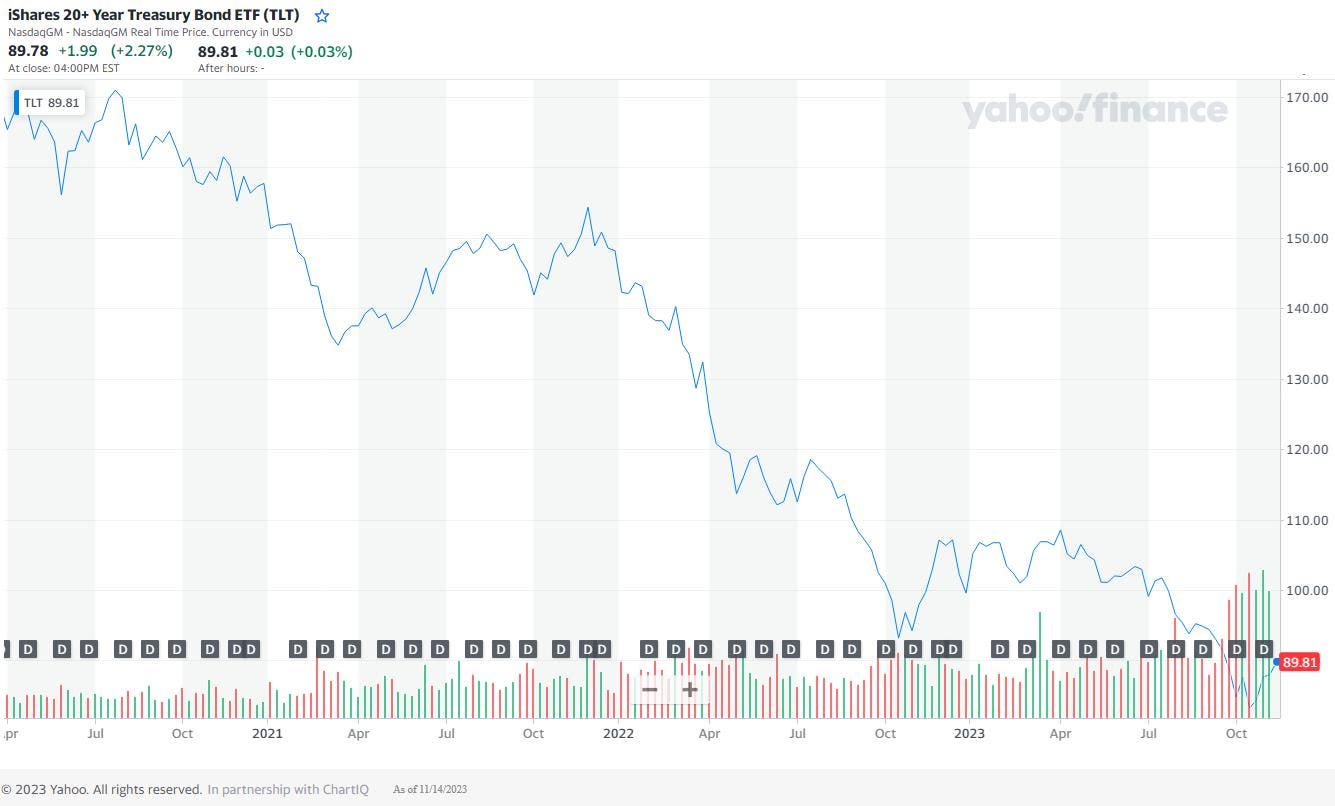Yes, you can lose half your money in government guaranteed bonds. The iShares index ETF “TLT
TLT
During the past few months, a confluence of events caused long duration bond yields to surge higher. As you know, surging yields causes bond prices to plumet in the opposite direction. While inflation readings have cooled in recent quarters, the pace appears to have plateaued in September, causing anxiety over future Fed policy actions. One contributing factor has been persistently tight labor markets that have emboldened labor unions to go on strike in recent months. This highlights the degree to which structural forces like income inequality and runaway deficit spending are coming home to roost. Other factors include stubbornly elevated inflation reports and struggling demand for Treasury auctions.
Recently, mortgage rates reached over 8% and many rate-sensitive areas of our economy, like housing, autos, capital goods and retail, to name a few, have begun to buckle. The impact of the rate surge is just beginning to be reflected in the broad economic data, but the impact on the consumer and corporate America is immediate and reflected in the recent poor performance of small-cap and highly levered, economically sensitive stocks.
The Federal Reserve voted early November to hold interest rates steady at 5.5%, marking the first time in nearly two years that it has paused rates at two consecutive meetings. Bond and equity prices have breathed a sign of relief, as the market lowered rates in expectation of a softer approach. This relief may be short lived as rates that remain at this elevated level continue to put stress on the economy, particularly in real estate and some banking institutions.
Even before the prospect of the U.S. financing another foreign war, the U.S. budget deficit has doubled sequentially to over $2 trillion, which is about a third of the entire federal budget for 2024. This is despite a strong job market and healthy economy. More worryingly, this deficit is projected to remain high for the foreseeable future. Recent requests for several hundred billion dollars of incremental defense spending to support our allies adds to this picture. Our national budget is showing signs of stress, with our debt rolling over into much higher carrying costs thanks to higher rates.
Risk assets like equities face an uncertain future. Our research shows that equity prices do not typically hit a bottom until well after the Federal Reserve starts cutting rates. Given this backdrop bond yields of 8% or higher in core plus and unconstrained portfolio’s offer a high target to beat. Since the equity markets have averaged about 10% for the last hundred years, an 8% return in bonds goes a long way. Please contact us to discuss the role of fixed income in your portfolio.
In 2002 Equitas Capital Advisors, LLC was established as a unique company that blends the resources of a large global corporation with the flexibility of a small boutique firm. The registered service mark of Equitas Capital Advisors is Engineering Financial Solutions® and the purpose of Equitas is to design, build, and deliver investment solutions to meet the goals and objectives of our investors. Equitas Capital Advisors, LLC located in New Orleans, has over 200 years of combined investment management consulting experience providing professional investment management services to investors such as foundations, endowments, insurance companies, oil companies, universities, corporate retirement plans, and high net worth family offices.
Disclosures and Disclaimers:
Above information is for illustrative purposes only. It has been obtained from reliable sources but no guarantee is made with regard to accuracy or completeness. It is not an offer to sell or solicitation to buy any security. The specific securities used are for illustrative purposes only and not a recommendation or solicitation to purchase or sell any individual security. All expressions of opinion reflect the judgment of the author on the date of publication and are subject to change. This publication does not involve the rendering of personalized investment advice.
Equitas Capital Advisors, LLC is registered as an investment advisor with the U.S. Securities and Exchange Commission (“SEC”) and only transacts business in states where it is properly registered, or is excluded or exempted from registration requirements. SEC registration does not constitute an endorsement of the firm by the Commission nor does it indicate that the advisor has attained a particular level of skill or ability.
Past performance may not be indicative of future results. Therefore, no current or prospective client should assume that the future performance of any specific investment or strategy will be profitable or equal to past performance levels. All investment strategies have the potential for profit or loss. Changes in investment strategies, contributions or withdrawals, and economic conditions may materially alter the performance of your portfolio. Different types of investments involve varying degrees of risk, and there can be no assurance that any specific investment or strategy will be suitable or profitable for an investor. Charts and references to returns do not represent the performance achieved by Equitas Capital Advisors, LLC, or any of its clients. Asset allocation and diversification do not assure or guarantee better performance and cannot eliminate the risk of investment losses. There can be no assurances that an investor’s portfolio will match or outperform any particular benchmark.
Read the full article here













